Excavation Contractors Westville
Find Excavating Contractors in Westville
Get up to 3 Excavating Contractors quotes for your project today! Compare profiles, reviews, accreditations, portfolio, etc... and choose the best offer.
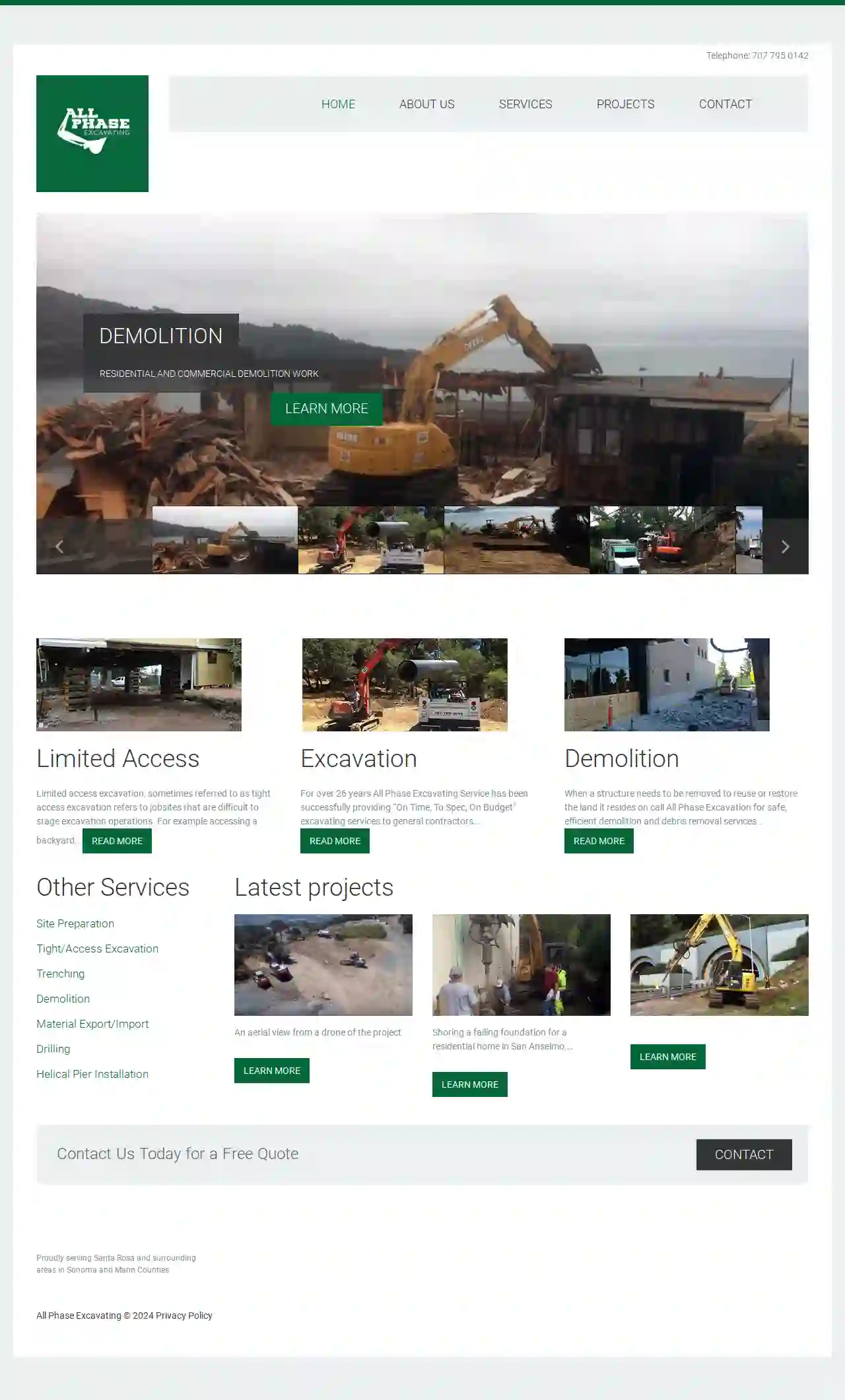
All Phase Excavating Inc
32 reviewsGary, USAbout All Phase Excavating "On time and on budget" is the goal of every excavation service company and at All Phase Excavation Service we add "done to perfection" to that tag line. When the carpenters show up to build the forms they'll find a site that is excavated to specifications, minimizing unnecessary work. We understand that a general contractor's primary concerns when selecting an excavation service include experience, capabilities, capacity, reliability, flexibility and of course a fair price. Excavation is typically the first task in starting a project and if that task is not performed to spec or is delayed it can have a serious impact on the success of the overall project. We understand the importance of being reliable and are prepared to perform the job as expected. The company started when founder and owner Vince Cheney launched All Phase Excavating in May of 1998 with a single bobcat and a pickup truck. He figured the way to be successful as a business owner is to do what you do best. "I really do enjoy excavating. I get a kick out of it and I decided that as I grew I would surround myself with other people who liked working excavation as much as I do." Serving Marin, Napa and Sonoma counties All Phase Excavating is headquartered in Penngrove with an equipment yard centrally located in Sonoma County. All Phase Excavating has grown from a single bobcat and a truck to 22 pieces of excavating and hauling equipment specifically acquired to tackle client needs. All Phase Excavating has the capability to tackle any excavating project large or small, from ground clearing to hauling debris. If It's an Excavating Challenge We Want a Shot at It As a general contractor you may not be overly concerned if your excavator is has a passion for moving earth but if you think about it, people who really enjoy their work are typically better at it than most. They see difficult jobs as a test of their skill and that's why we excel at tight access, hillside excavation, full and partial structure demolition and abatement and other demanding excavating projects. Vince is personally involved onsite in every project often working side by side with his crews. This onsite management involvement assures quality work and allows for streamlined communications with the general contractor. All Phase is a Responsible Community Business Is there a Californian that is not aware of the state's efforts to protect and improve our environment? At All Phase Excavation we are in full compliance with requirements with DPF requirements and our abatement service
- Services
- Why Us?
- Gallery
Get Quote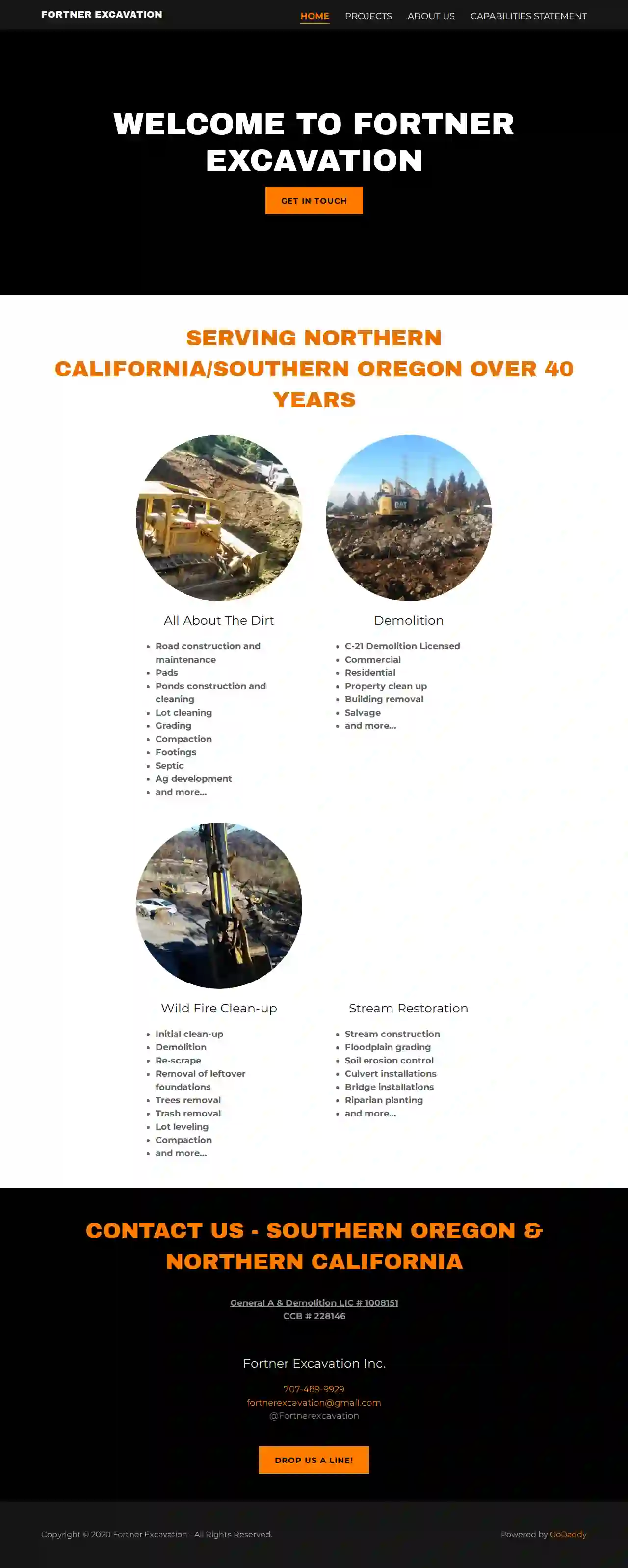
Fortner Excavation, Inc.
Chico, USAbout Us Bobby and Delaine Fortner started with 1 Backhoe and a beat up old Dump truck in December of 1979. They had a $300 payment on that backhoe and sweated every month to pay that payment. They loved it though. They wanted to be independent, self employed business owners. Since that time they have grown a little each year. Now in 2020, along with their 2 sons, they are continually making this business grow and evolve. Travis and Jeff are owners and Shareholders. We Are Expanding We are now located in the Medford and Southern Oregon area. Jeff Fortner is our “Go To Guy” for all the Jobs in that area. He is constantly working towards keeping the company running smoothly. Travis Fortner has a Tree Hedging company in addition to excavation at the Chico location and is still involved and bringing us lots of work and helping out on the side lines. Family Owned, Locally Grown We are 2nd and 3rd generation to Northern California. And we have expanded to Southern Oregon. We live and work here so we care about our customers and our quality of workmanship on every job. We are licensed to do excavation and demolition.
- Services
- Why Us?
- Our Team
- Gallery
Get Quote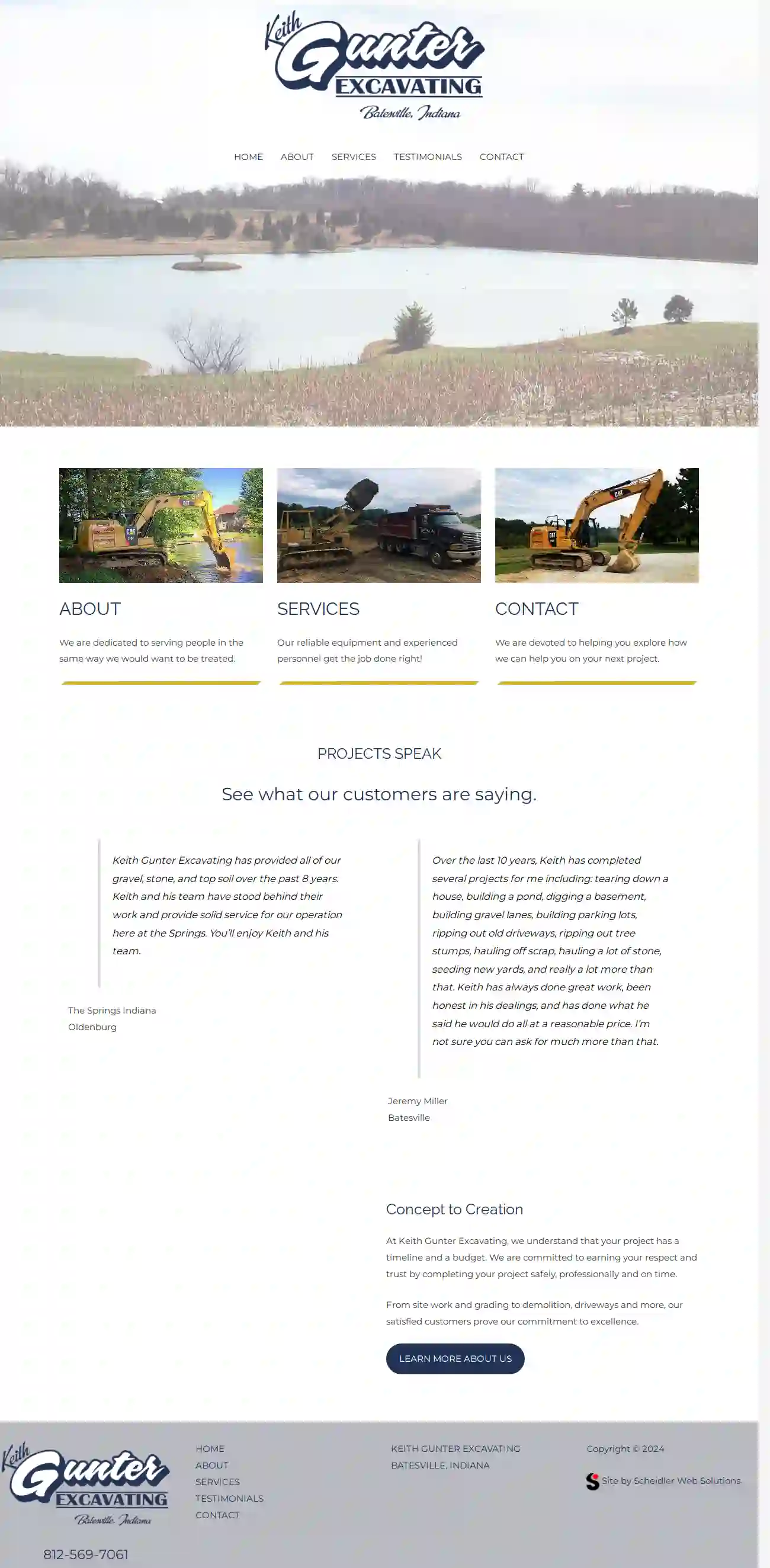
Keith Gunter Excavating LLC
515 reviewsBatesville, USWho We Are. Welcome to Keith Gunter Excavating! Keith Gunter Excavating is a third-generation, family-owned business based in Batesville, Indiana. With nearly 60 years of combined excavating experience, Keith and his team handle the ‘dirty’ work, Abby ‘digs’ handling the books, and the two youngest Gunter girls are ‘entrenched’ with looking cute and having fun. Keith Gunter Excavating offers a full-range of residential and commercial services across Southeastern Indiana. We are qualified to handle a variety of projects and will work hard to ensure you are completely satisfied!
- Services
- Why Us?
- Testimonials
- Gallery
Get Quote
English Excavating
4.615 reviews7402 Lake Road, Indianapolis, 46217, USAbout Us We're a complete site development company as well as a service/repair company. Our work scope includes earthwork and site grading, building demolition, tree clearing plus erosion control. We can do a 1-day project or build subdivisions with 10-acre lakes. Our goal is to provide our clients with a strong responsive excavation team that knows how to get the job done correctly, on time, within budget and with pride. Install Throughout our 60-year history starting with Lowell English, Mark and Mick English have devoted their resources to knowing every project inside and out so that every project satisfies the customer. You can count on us for underground water line installation, sewer line repair, drainage excavation and more. Our knowledgeable crew is also capable of servicing city sewers and city water lines. Repair Hard work, ambition, safety, honesty, and the desire to be a superior presence in a demanding business have won our reputation of quality and dependability. Our company was founded on the premise that quality construction principals and attention to detail should be our standard. And it does not stop with the construction of a project. Service afterwards has always been a part of our tradition and commitment.
- Services
- Why Us?
- Our Team
- Testimonials
- Gallery
Get Quote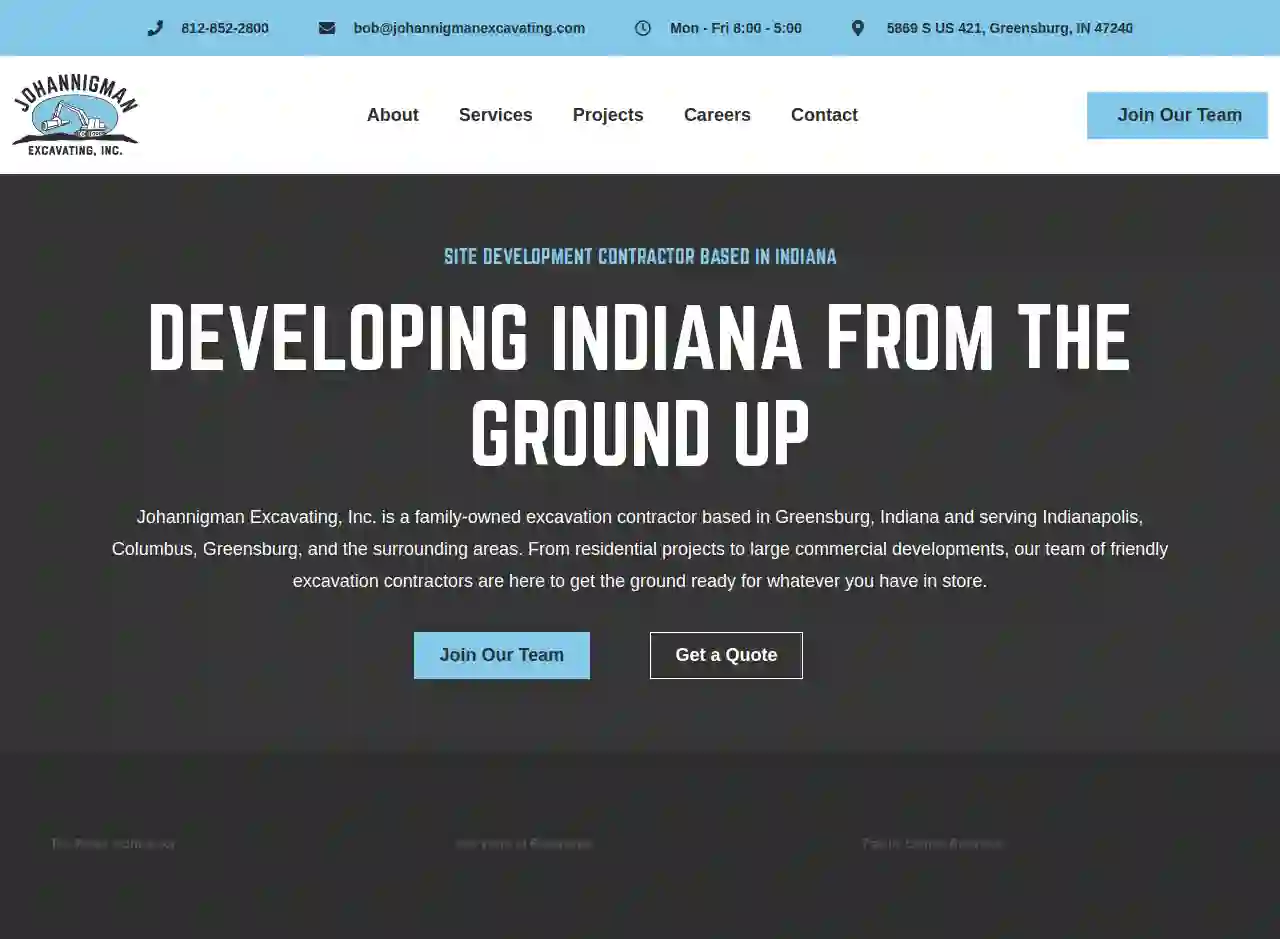
Johannigman Excavating, Inc
55 reviews5869 S US 421, Greensburg, 47240, USAbout Johannigman Excavating Johannigman Excavating, Inc. is a family-owned excavation contractor based in Greensburg, Indiana and serving Indianapolis, Columbus, Greensburg, and the surrounding areas. From residential projects to large commercial developments, our team of friendly excavation contractors are here to get the ground ready for whatever you have in store. Digging Deep for Indiana Since 1978 Our story begins with one man and his bulldozer over fifty years ago. Our grandfather, Roman Johannigman, was always on hand to help friends and neighbors clear and prepare their land for farming. In 1978, Roman handed over the keys to the dozer to his sons Ed and John – and Johannigman Excavating was born. Since then, we’ve been serving Indianapolis, Columbus, Greensburg, and their surrounding areas.
- Services
- Why Us?
- Gallery
Get Quote
McCoy's Driveway Stone
511 reviews4914 Wycliff East Dr, Indianapolis, 46221, USWelcome to McCoy's Driveway Stone McCoy's Driveway Stone has been serving Indianapolis and the surrounding counties since 1979. We are a family-owned and operated business that is fully licensed, bonded, and insured. We are proud to offer our customers the best of everything, including free estimates, high-quality workmanship, and exceptional customer service. We are known for our reliability, dependability, and punctuality. We are always on time and always strive to exceed our customers' expectations. We have over 30 years of experience in the industry and are proud to have received Angie's List highest award for service two years running. We offer a wide variety of products and services to meet the needs of our residential and commercial customers. Please feel free to browse our website to learn more about what we offer.
- Services
- Why Us?
- Gallery
Get Quote
Excavation DHS
2035 Butte House Rd, Yuba City, 95993, USBegin Your Excavation Journey With DHS Explore the possibilities with Heavy Handyman Division. Contact us to receive a personalized excavation quote that meets your project's specific requirements, completely free of charge. Company Overview: At Heavy Handyman Division, we have been providing top-notch excavation and site preparation services since our inception. Our team is equipped with the knowledge and machinery to handle all your site work needs efficiently. Serving a wide area including Sacramento, Chico, Roseville, and many other locations within a 50 to 60-mile radius from Yuba City, California, we are your dedicated excavation specialists. We offer precise and environmentally conscious excavation services for both residential and commercial projects. Leveraging our expertise, we ensure your project is completed on time and within budget, exceeding your expectations.
- Services
- Why Us?
- Testimonials
- Gallery
Get Quote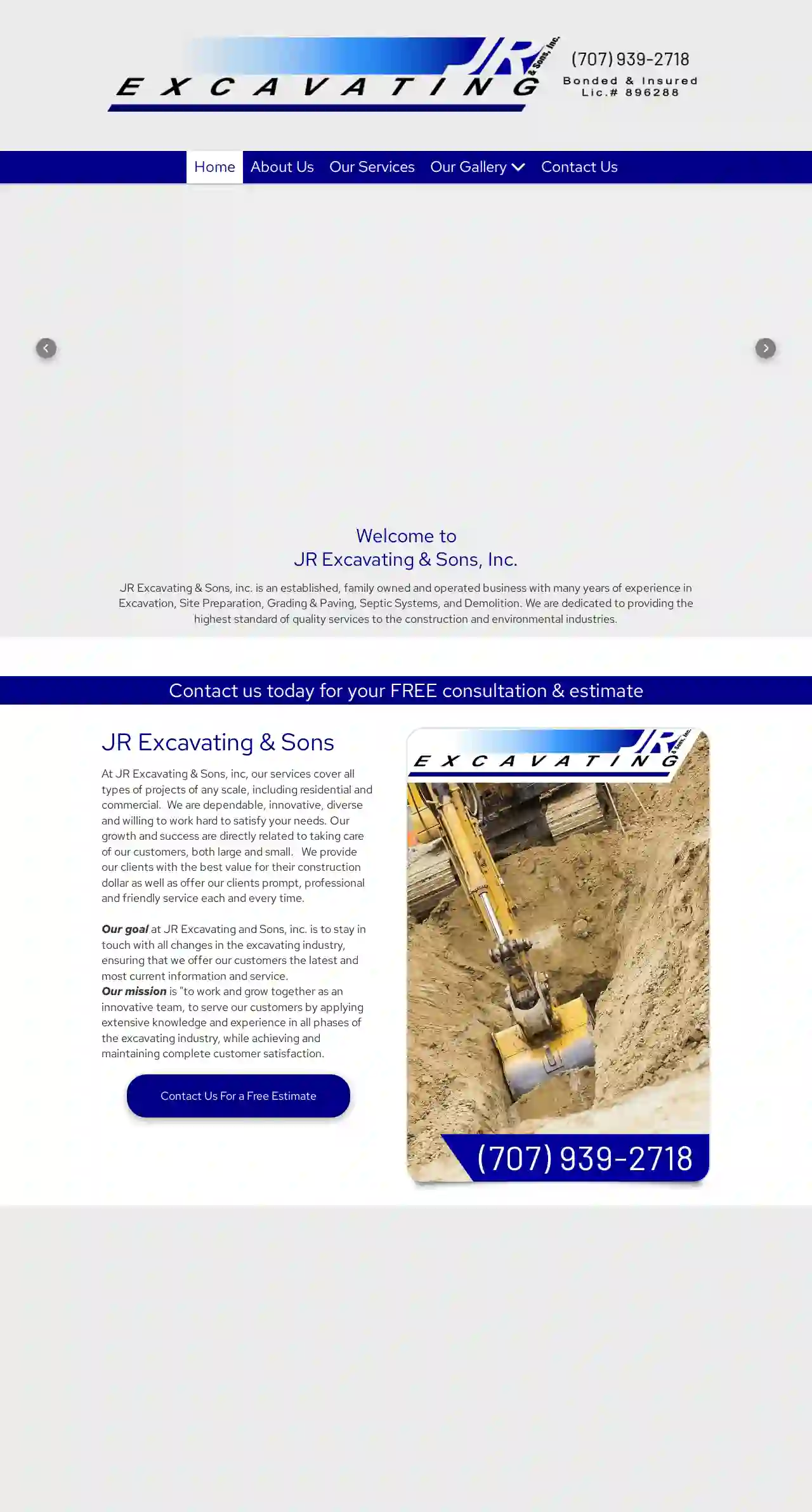
J R Excavating & Sons Inc
54 reviews120 Meadowlark Lane, Sonoma, 95476, USJR Excavating & Sons, Inc. is a family-owned and operated business with years of experience in excavation, site preparation, grading & paving, septic systems, and demolition. We are dedicated to providing the highest standard of quality services to the construction and environmental industries. Our services cover all types of projects of any scale, including residential and commercial. We are dependable, innovative, diverse and willing to work hard to satisfy your needs. Our growth and success are directly related to taking care of our customers, both large and small. We provide our clients with the best value for their construction dollar as well as offer our clients prompt, professional and friendly service each and every time. Our goal at JR Excavating and Sons, inc. is to stay in touch with all changes in the excavating industry, ensuring that we offer our customers the latest and most current information and service. Our mission is "to work and grow together as an innovative team, to serve our customers by applying extensive knowledge and experience in all phases of the excavating industry, while achieving and maintaining complete customer satisfaction."
- Services
- Why Us?
- Our Team
- Gallery
Get Quote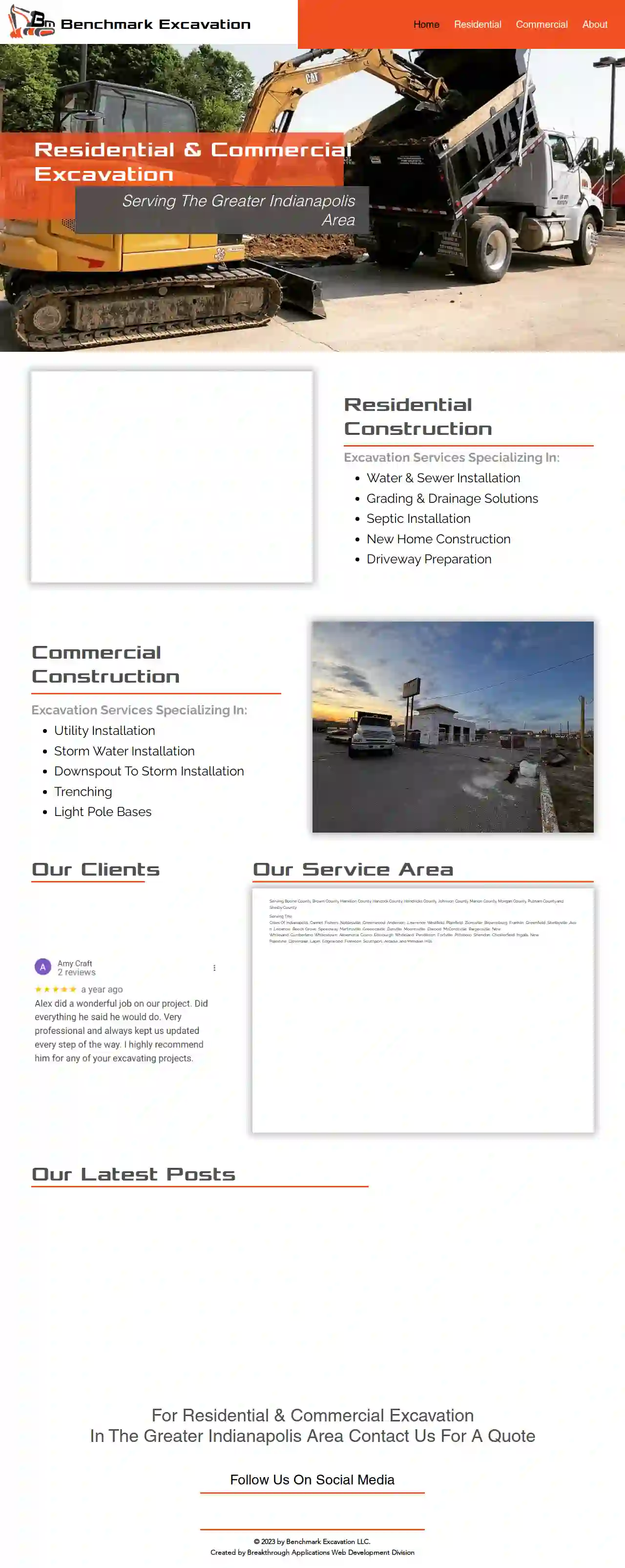
Benchmark Excavation LLC
517 reviewsIndianapolis, USBenchmark Excavation Serving Boone County, Brown County, Hamilton County, Hancock County, Hendricks County, Johnson County, Marion County, Morgan County, Putnam County, and Shelby County. Serving The Cities Of Indianapolis ,Carmel ,Fishers ,Noblesville ,Greenwood ,Anderson ,Lawrence ,Westfield ,Plainfield ,Zionsville ,Brownsburg ,Franklin ,Greenfield ,Shelbyville ,Avon ,Lebanon ,Beech Grove ,Speedway ,Martinsville ,Greencastle ,Danville ,Mooresville ,Elwood ,McCordsville ,Bargersville ,New Whiteland ,Cumberland ,Whitestown ,Alexandria ,Cicero ,Edinburgh ,Whiteland ,Pendleton ,Fortville ,Pittsboro ,Sheridan ,Chesterfield ,Ingalls ,New Palestine ,Cloverdale ,Lapel ,Edgewood ,Frankton ,Southport ,Arcadia ,and Meridian Hills. Our Clients Our Service Area Residential & Commercial Excavation Serving The Greater Indianapolis Area Contact Us Residential Construction Excavation Services Specializing In: Water & Sewer Installation Grading & Drainage Solutions Septic Installation New Home Construction Driveway Preparation Contact Us Today 1.310.703.4478 Commercial Construction Excavation Services Specializing In: Utility Installation Storm Water Installation Downspout To Storm Installation Trenching Light Pole Bases Contact Us Today 1.310.703.4478
- Services
- Why Us?
- Gallery
Get Quote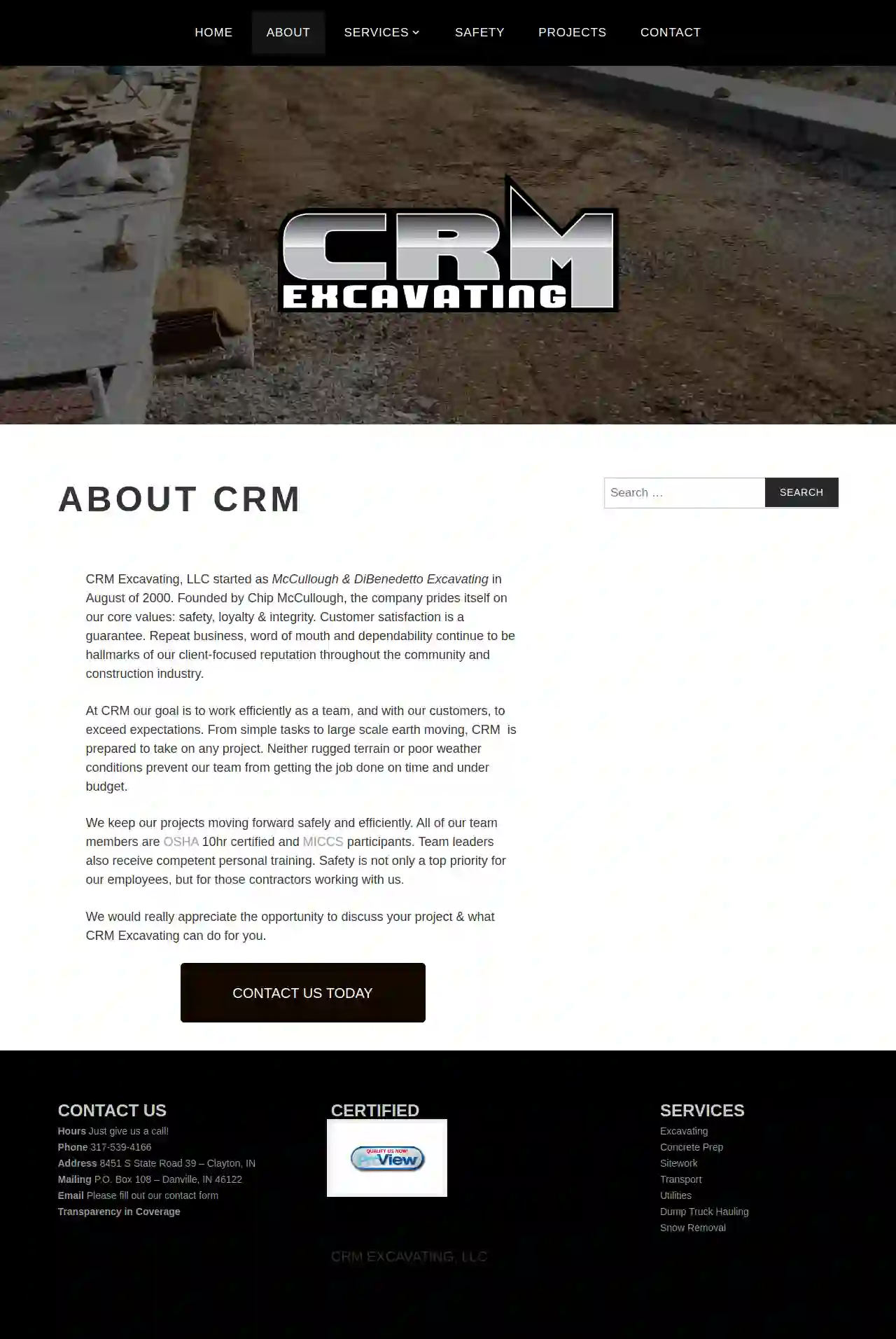
CRM Excavating
4.99 reviews8451 S State Rd 39, Clayton, 46118, USAbout CRM Excavating CRM Excavating, LLC started as McCullough & DiBenedetto Excavating in August of 2000. Founded by Chip McCullough, the company prides itself on our core values: safety, loyalty & integrity. Customer satisfaction is a guarantee. Repeat business, word of mouth and dependability continue to be hallmarks of our client-focused reputation throughout the community and construction industry. At CRM our goal is to work efficiently as a team, and with our customers, to exceed expectations. From simple tasks to large scale earth moving, CRM is prepared to take on any project. Neither rugged terrain or poor weather conditions prevent our team from getting the job done on time and under budget. We keep our projects moving forward safely and efficiently. All of our team members are OSHA 10hr certified and MICCS participants. Team leaders also receive competent personal training. Safety is not only a top priority for our employees, but for those contractors working with us. We would really appreciate the opportunity to discuss your project & what CRM Excavating can do for you.
- Services
- Why Us?
- Gallery
Get Quote
Over 22,076+ Excavation Pros onboarded
Our excavation contractors operate in Westville and surrounding areas!
ExcavationHQ has curated and vetted the Best Excavation Contractors in and around Westville. Find a top & trustworthy business today.
Frequently Asked Questions About Excavation Contractors
- Planning and Surveying: Defining the excavation area, marking utility lines, and determining the required depth and grade.
- Site Preparation: Clearing vegetation, removing obstacles, and ensuring site accessibility.
- Excavation: Using appropriate equipment (excavators, backhoes, etc.) to remove earth and create the desired excavation.
- Hauling and Disposal: Transporting excavated material to designated disposal sites, complying with environmental regulations.
- Backfilling and Compaction: Refilling the excavation with suitable material and compacting it to achieve the required density and stability.
- Grading and Finishing: Leveling and shaping the surface to the final grade for landscaping or construction.
- Excavators: Versatile machines with a bucket, arm, and rotating cab for digging, lifting, and moving earth.
- Backhoes: Similar to excavators but with a digging bucket on the back and a loader bucket on the front, ideal for trenching and smaller excavations.
- Bulldozers: Powerful machines with a large blade for pushing earth, clearing land, and leveling surfaces.
- Skid Steers: Compact and maneuverable loaders with various attachments (buckets, forks) for digging, loading, and grading in tight spaces.
- Trenchers: Specialized machines for digging narrow trenches for utilities.
- Dump Trucks: Vehicles for hauling excavated material to disposal sites.
- Basement Size: The larger the basement, the more excavation is required, increasing the cost.
- Soil Type: Excavating rocky or dense clay soil is generally more expensive than loose soil.
- Accessibility: Difficult-to-access sites might require specialized equipment or more labor, driving up costs.
- Foundation Type: The chosen foundation type (full basement, crawl space, slab) affects excavation needs.
- Underpinning: If underpinning (strengthening existing foundations) is necessary, it significantly increases costs.
- Disposal Fees: Hauling excavated soil to disposal sites adds to the overall expense.
What is the excavation process?
What equipment is used for excavation?
How much does it cost to excavate a basement?
What is the difference between excavation and grading?
Excavation: Primarily involves removing earth or other materials from a site. It's about digging down and creating space.
Grading: Focuses on shaping and leveling the ground to a specific slope or elevation. It's about adjusting the existing terrain.
For example, you might excavate a foundation and then grade the surrounding area to ensure proper drainage and a level surface for landscaping.
What is the excavation process?
- Planning and Surveying: Defining the excavation area, marking utility lines, and determining the required depth and grade.
- Site Preparation: Clearing vegetation, removing obstacles, and ensuring site accessibility.
- Excavation: Using appropriate equipment (excavators, backhoes, etc.) to remove earth and create the desired excavation.
- Hauling and Disposal: Transporting excavated material to designated disposal sites, complying with environmental regulations.
- Backfilling and Compaction: Refilling the excavation with suitable material and compacting it to achieve the required density and stability.
- Grading and Finishing: Leveling and shaping the surface to the final grade for landscaping or construction.
What equipment is used for excavation?
- Excavators: Versatile machines with a bucket, arm, and rotating cab for digging, lifting, and moving earth.
- Backhoes: Similar to excavators but with a digging bucket on the back and a loader bucket on the front, ideal for trenching and smaller excavations.
- Bulldozers: Powerful machines with a large blade for pushing earth, clearing land, and leveling surfaces.
- Skid Steers: Compact and maneuverable loaders with various attachments (buckets, forks) for digging, loading, and grading in tight spaces.
- Trenchers: Specialized machines for digging narrow trenches for utilities.
- Dump Trucks: Vehicles for hauling excavated material to disposal sites.
How much does it cost to excavate a basement?
- Basement Size: The larger the basement, the more excavation is required, increasing the cost.
- Soil Type: Excavating rocky or dense clay soil is generally more expensive than loose soil.
- Accessibility: Difficult-to-access sites might require specialized equipment or more labor, driving up costs.
- Foundation Type: The chosen foundation type (full basement, crawl space, slab) affects excavation needs.
- Underpinning: If underpinning (strengthening existing foundations) is necessary, it significantly increases costs.
- Disposal Fees: Hauling excavated soil to disposal sites adds to the overall expense.
What is the difference between excavation and grading?
Excavation: Primarily involves removing earth or other materials from a site. It's about digging down and creating space.
Grading: Focuses on shaping and leveling the ground to a specific slope or elevation. It's about adjusting the existing terrain.
For example, you might excavate a foundation and then grade the surrounding area to ensure proper drainage and a level surface for landscaping.